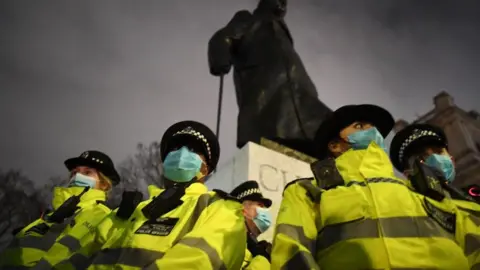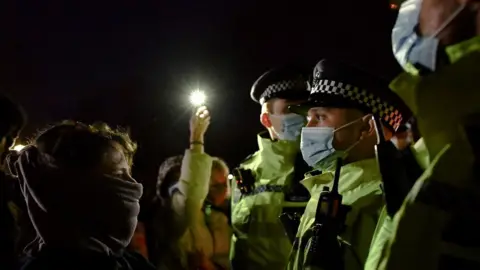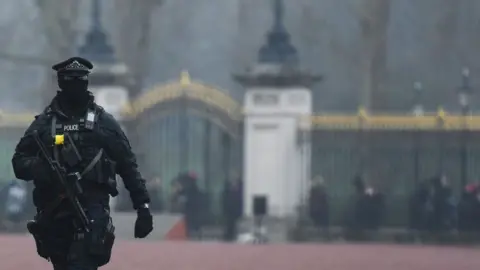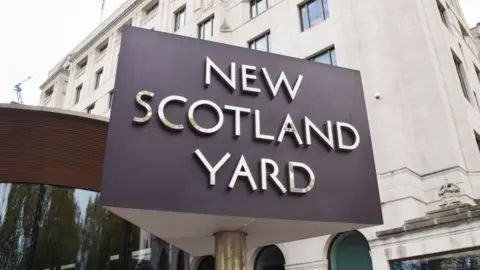Met Police report: Rape cases ruined, Sikh officer's beard cut... five findings from Casey review
 Getty Images
Getty ImagesA damning report into the culture and standards of the Metropolitan Police has laid bare deep and widespread failings in the force.
Discrimination is baked into it; it is failing women and children; it is unable to police itself; and public confidence has been shattered, Baroness Louise Casey concluded.
Here are five striking findings from the 363-page report:
Rape cases dropped due to broken freezer
The "de-prioritisation and de-specialisation" of public protection - in areas like child protection, rape and serious sexual offences - has put women and children at greater risk than necessary, the review says.
It says officers investigating rape and serious sexual offences have to deal with "over-stuffed, dilapidated or broken" fridges and freezers containing evidence, and must endure long waits for results.
Evidence from victims of sexual violence, such as swabs, blood samples and underwear, was destroyed when one freezer broke down in the 2022 heatwave.
This meant the related cases of alleged rape being investigated would be dropped, an anonymous officer told the review.
Three officers would be needed to close freezers containing forensic samples because they were so full, officer G said, adding the fridges used as part of rape cases were in a "bad shape, packed and ruining evidence".
Sikh officer's beard cut 'because it was funny'
The report identified widespread bullying in the force, which it called institutionally racist, misogynist and homophobic.
Among many examples, one Sikh officer had his beard trimmed because another officer thought it was funny, while another's turban was put in a shoebox.
 Reuters
ReutersIn another case, a Muslim officer found bacon had been put in his boots inside his locker. He was "horrified" but did not tell anyone about the incident for fear of reprisals.
Among other targeted acts, an openly gay, black, male officer who was mocked in front of others, had his belongings and uniform hidden and his locker vandalised.
Almost one in five lesbian, gay and bisexual Met employees had personally experienced homophobia, the review found.
Officer E said that after talking to other colleagues about their experiences: "I am scared of the police. I don't trust my own organisation."
Women forced to eat whole cheesecakes
The review was told about the humiliation of junior staff through initiation tests.
A female officer said hierarchies, bullying and humiliation of junior officers was "rife" in the specialist unit where she worked.
Initiations included food-eating challenges, such as women being forced to eat whole cheesecakes until they vomited, according to officer H.
 Getty Images
Getty ImagesShe was told about a male officer being sexually assaulted in the showers as part of their own initiation, something she said was openly talked and joked about by colleagues.
Those who refused to participate were ostracised and considered "not to be part of the team", she said.
There were also reports of people being urinated on in the shower.
Officers encouraged to delete WhatsApps
In February last year, discriminatory WhatsApp messages emerged that were sent by officers based at Charing Cross police station.
Later that month saw the launch of the internal campaign Not In My Met, designed to encourage staff to speak out about discrimination.
According to officer G, colleagues were encouraged to delete WhatsApp messages during a meeting about the campaign.
She says officers were told to "look carefully" at their WhatsApps and Facebook messages and that "they're coming for everyone now, protect yourselves".
 Getty Images
Getty ImagesShe said she was aware of colleagues in other briefings receiving the same message.
The report said WhatsApp also figured in "troubling practices designed to prevent poor conduct from coming to light".
In one of the Met's specialist units, firearms command MO19, the report says some officers were primed on what to do if a WhatsApp, Signal or Telegram group was "compromised" - for example if there was a complaint about its contents or someone was under a misconduct investigation.
Officers in the unit would type LANDSLIDE into the group - prompting members to immediately leave the group, delete its contents and create a new group.
Child seeking help 'completely lost' after arrest
Concerns around the treatment of children by the police were thrown into the spotlight last year by the case of Child Q, a black schoolgirl who was strip searched by two Met officers at school while on her period.
The report says figures revealing the racial disproportionality in intimate searches lend weight to the claim that "adultification" - where black children are treated as adults and as a threat, justifying greater use of force or intrusion - is present in the force.
In one case, a black boy told a professional outside the police that he was carrying a knife for protection, and was involved in a gang but wanted help to leave.
The child was assaulted by an adult on a later date and the professional contacted the police to report the assault and hand in the knife. A different unit attended and arrested the boy.
"We completely lost him, he totally disengaged", the review was told.
The review said there was evidence the Met may consider that mistakes could be made in officers' actions towards black children, but there was also an unwillingness to interrogate whether there were broader issues around race, desensitisation and systematic bias.
This, it said, was "symptomatic of the Met's approach to understanding, recognising, and responding to allegations of racism within its ranks".

Have you been affected by the issues in this story? Share your experiences by emailing [email protected].
Please include a contact number if you are willing to speak to a BBC journalist. You can also get in touch in the following ways:
- WhatsApp: +44 7756 165803
- Tweet: @BBC_HaveYourSay
- Upload pictures or video
- Please read our terms & conditions and privacy policy
If you are reading this page and can't see the form you will need to visit the mobile version of the BBC website to submit your question or comment or you can email us at [email protected]. Please include your name, age and location with any submission.
